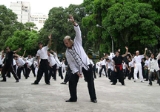
Qigong
Overview
Qigong or chi kung (气功 or 氣功) is a practice of aligning breath, movement, and awareness for exercise, healing, and meditation. With roots in Chinese medicine
, martial arts
, and philosophy
, qigong is traditionally viewed as a practice to balance qi
(chi) or what has been translated as "intrinsic life energy." Typically a qigong practice involves rhythmic breathing, coordinated with slow stylized repetition of fluid movement, and a calm mindful state.
Traditional Chinese medicine
Traditional Chinese Medicine refers to a broad range of medicine practices sharing common theoretical concepts which have been developed in China and are based on a tradition of more than 2,000 years, including various forms of herbal medicine, acupuncture, massage , exercise , and dietary therapy...
, martial arts
Chinese martial arts
Chinese martial arts, also referred to by the Mandarin Chinese term wushu and popularly as kung fu , are a number of fighting styles that have developed over the centuries in China. These fighting styles are often classified according to common traits, identified as "families" , "sects" or...
, and philosophy
Chinese philosophy
Chinese philosophy is philosophy written in the Chinese tradition of thought. The majority of traditional Chinese philosophy originates in the Spring and Autumn and Warring States era, during a period known as the "Hundred Schools of Thought", which was characterized by significant intellectual and...
, qigong is traditionally viewed as a practice to balance qi
Qi
In traditional Chinese culture, qì is an active principle forming part of any living thing. Qi is frequently translated as life energy, lifeforce, or energy flow. Qi is the central underlying principle in traditional Chinese medicine and martial arts...
(chi) or what has been translated as "intrinsic life energy." Typically a qigong practice involves rhythmic breathing, coordinated with slow stylized repetition of fluid movement, and a calm mindful state.

